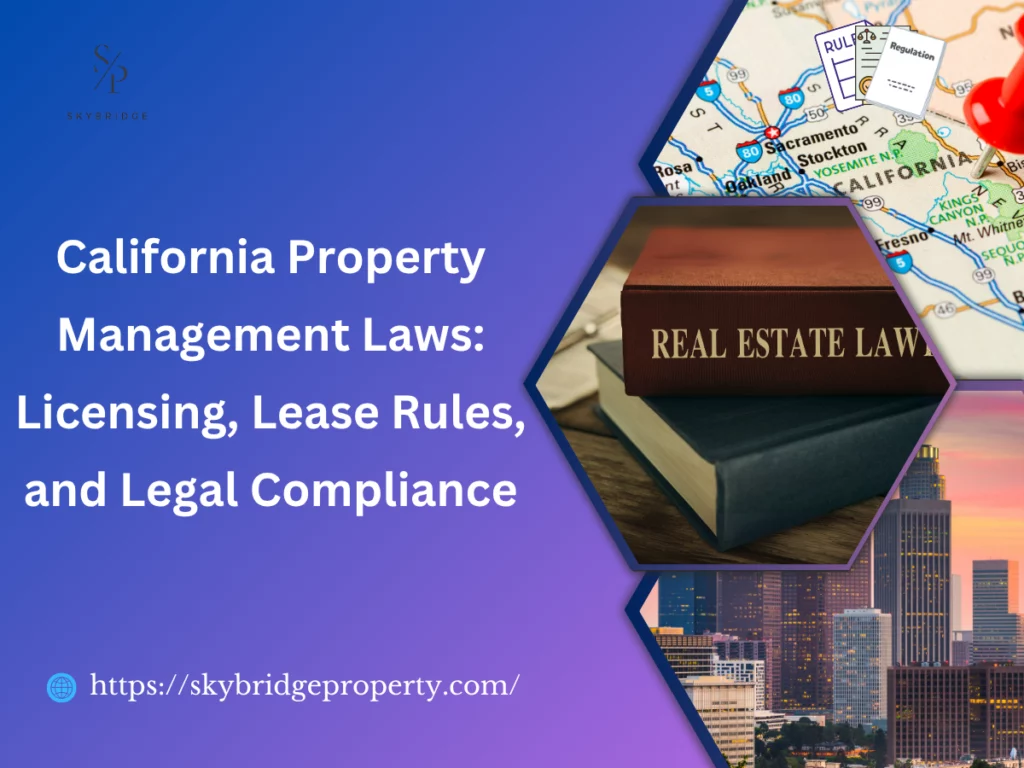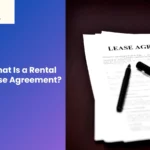California property management laws define the legal standards for operating residential and commercial rental properties within the state. These regulations apply to anyone overseeing key tasks such as rent collection, maintenance, lease enforcement, and tenant communication. Whether acting independently or through a management company, property managers are expected to follow strict legal guidelines set by state authorities.
Compliance involves a broad legal framework, including statutes from the California Civil Code, the Business and Professions Code, and oversight by the Department of Real Estate (DRE). These laws govern licensing, lease agreement terms, notification procedures, tenant protections, and dispute resolution. Even routine actions such as managing electrical systems or initiating eviction processes must follow state law.
Failure to comply can lead to serious consequences, including fines, lawsuits, and license revocation. For property managers, understanding and following California property management laws is not just about legal protection. It is essential for maintaining operational integrity, reducing liability, and supporting long-term profitability.
Below is a summary of the key California property management laws every landlord and property manager should know.
- Licensing Requirements: California law requires property managers who collect rent, negotiate leases, or oversee properties to hold a valid real estate broker license or operate under a licensed broker.
- Rental Application Fees: Landlords may charge a screening fee up to $30 per applicant, allowing them to access a consumer credit report.
- Security Deposits: Non-refundable move-in fees are prohibited. Security deposits are capped at two months’ rent for unfurnished units and three months’ rent for furnished units.
- Lease Termination and Notification: Landlords must provide written notice to terminate a tenancy: 3 days for rent nonpayment, 30 days for tenancies under one year, and 60 days for tenancies over one year. For subsidized housing, a 90-day notice is required.
- Rent Control: Under AB 1482, rent increases are limited to 5% plus local CPI or 10% of the previous year’s rent, whichever is lower.
- Late Fees: Late fees must be reasonable and documented in the lease agreement. Courts may deem fees over 5% of monthly rent excessive unless properly justified.
- Disclosure Requirements: Landlords must inform tenants about mold hazards, lead-based paint or corroded lead pipes in pre-1978 properties, the presence of registered sex offenders in the same ZIP code, and shared utility costs among tenants.
- Entry Notice: Landlords must provide reasonable written notice before entering a tenant’s unit during business hours, except in emergencies or other legally defined situations.
- Habitability Requirements: Landlords must maintain a habitable property, ensuring functional plumbing, gas, heating, lighting, electrical systems, and sanitation.
- Abandoned Property: Landlords must notify tenants in writing if they leave property behind, store it for at least 33 days, and follow specific disposal rules based on property value.
- Retaliation Prohibition: Landlords cannot retaliate against tenants for exercising their legal rights, including filing complaints or joining tenant unions.
- Unlicensed Management Penalties: Managing property without a valid real estate license can result in DRE enforcement, fines, and invalidated leases. Both managers and owners can be held liable.
Real Estate Licensing Requirements in California
In California, property managers are legally required to hold a real estate license issued by the Department of Real Estate (DRE) if they engage in activities such as leasing, rent collection, or contract negotiation. This ensures that property managers are trained, vetted, and legally authorized to perform key duties such as leasing, collecting rent, and interacting with tenants. Below are the key requirements to legally obtain a real estate license:
- Applicants must be at least 18 years old and have a valid Social Security number or Individual Taxpayer Identification Number (ITIN).
- They must complete three or eight college-level courses, based on the license type. Also broker applicants must have two years of full-time salesperson experience or a four-year real estate degree.
- Candidates must pass the California licensing exam administered at official testing centers.
- Applicants must complete Live Scan fingerprinting and pass a background check before the DRE issues the license via its eLicensing portal.
Who Needs a Real Estate License to Manage Property in California?
Any individual who manages property in California for compensation and performs activities such as collecting rent, negotiating leases, or securing tenants must have a valid real estate license. These functions are considered regulated real estate activities and fall under the jurisdiction of the Department of Real Estate (DRE).
To comply with the law, property managers must either hold a broker license, which allows independent operations like leasing units, collecting rent on behalf of others, or managing trust accounts, or a salesperson license, which permits assisting in property management activities under the direct supervision of a licensed broker.
Meanwhile, acting as a property manager without the proper license can result in serious consequences. Penalties may include disciplinary action from the Department of Real Estate (DRE), civil fines, or unenforceable lease agreements. Both the manager and the hiring property owner may be held liable under California law.
Types of Licenses: Broker vs. Salesperson
In California, property managers must hold a valid real estate license as either a broker or a salesperson. Each license type defines what activities the holder can perform and under what conditions.
Broker License
A broker license provides the highest level of control in property management. Brokers are legally allowed to work independently and are responsible for overseeing real estate transactions and staff. To qualify, specific education and experience requirements must be met. Key features of a broker license include:
- The ability to operate independently without supervision
- Permission to manage trust accounts and handle client funds
- Legal authority to sign leases and property management contracts
- The right to supervise salespersons and other license holders
- Eligibility to open and manage a property management company
- Completion of eight approved college-level real estate courses
- At least two years of full-time experience as a licensed salesperson within the past five years, or a four-year real estate degree
Salesperson License
A salesperson license, on the other hand, is designed for those entering the property management field. Salespersons support real estate functions but must be supervised by a licensed broker. The main characteristics of a salesperson license are:
- Required supervision by a licensed broker
- Ability to assist with showing rental units and processing applications
- Prohibited from handling trust accounts or signing lease agreements
- Limited to tasks delegated by the supervising broker
- Ideal for gaining experience before pursuing a broker license
DRE Verification and License Lookup Procedures
Before working with any real estate professional in California, it is important to verify their license status through the Department of Real Estate (DRE). The DRE offers a public online lookup tool that helps confirm whether a property manager or broker is properly licensed and in good standing. This step helps property owners and tenants avoid working with unqualified or unlicensed individuals. To complete the verification process, follow these steps:
- Visit the official DRE license lookup page.
- Search using the individual’s name, license number, or company name.
- Review key license details, including current status, expiration date, and disciplinary actions, if any.
- Confirm whether the license is active and whether it is a broker or salesperson license.
- Use this information to make informed decisions when hiring or partnering with a property manager.
Exemptions to Licensing Rules
Although California law requires most property managers to be licensed, there are a few specific situations where a license is not required. These exemptions are limited and depend on the nature of the duties performed, the method of compensation, and the relationship between the worker and the property owner. If a role falls into one of these defined categories, the individual may operate legally without holding a real estate license. Common exemptions include the following:
- On-site residential managers who live at the property and are paid a salary directly by the owner or management company.
- Property owners who manage their buildings and do not collect fees from others.
- Regular employees performing only clerical or support tasks under the supervision of a licensed broker.
- Individuals who do not handle trust funds, negotiate leases, or collect rent for others.
- Roles that meet exemption criteria must still comply with all employment and disclosure laws and may be reviewed by the DRE for compliance.
Lease Termination and Notification Rules
California law requires landlords to provide proper written notice before making any changes to a lease agreement or ending a tenancy. The notice period and format depend on factors such as the type of lease, how long the tenant has lived on the property, and whether the property is subject to local rent control ordinances. Whether ending a month-to-month rental, transferring ownership, or addressing a lease violation, landlords must follow clearly defined state and local procedures to avoid legal disputes and ensure valid lease termination.
Change of Ownership Notices to Tenants
When a rental property changes ownership or management in California, the current or new owner must notify tenants in writing. This notice must include the name, address, and contact details of the new owner or property manager, along with instructions on where and how to pay rent. Under Civil Code Section 1962, this written notice must be delivered within 15 calendar days of the change. Failure to provide this notice may delay rent obligations and expose landlords to legal challenges or delayed enforcement of lease terms.
Lease Renewal Rights and Refusals
Tenants in California have specific rights regarding lease renewals, especially in rent-controlled or just-cause jurisdictions. Landlords are generally not obligated to renew a fixed-term lease unless local ordinances say otherwise. However, when offering renewal, landlords must provide clear terms and allow tenants to accept or decline without coercion. If a tenant refuses to renew, and the lease converts to a month-to-month arrangement, the landlord must follow standard termination rules. Tenants who face forced non-renewal in regulated areas may challenge the action as an unlawful eviction if proper cause is not provided.
Month-to-Month Termination Protocols
Month-to-month rental agreements in California can be ended by either the landlord or the tenant, but proper written notice must be given. If the tenant has lived in the property for less than one year, a 30-day notice is required. For tenancies over one year, a 60-day notice is needed. Under laws such as AB 1482 (the California Tenant Protection Act of 2019), landlords may also be required to state a valid reason for termination, particularly in cities with just-cause protections. Notices must be served in writing and delivered according to legal standards to avoid delays or disputes.
Required Notice Periods under California Law
California requires different notice periods based on the lease type and reason for termination. A 3-day notice applies to issues like nonpayment of rent or lease violations. To end a month-to-month lease, landlords must give 30 days’ notice if the tenant has lived there less than a year, or 60 days if it has been longer. A 90-day notice is required for tenants in subsidized housing. All notices must be properly documented and delivered using legal methods such as personal service or certified mail. If the notice rules are not followed correctly, the termination may be considered invalid.
Rent Control and Late Fee Regulations
California limits rent increases and late fees through statewide laws like AB 1482 and various local ordinances. These rules affect how much rent can be raised, when fees can be charged, and what notice must be given. Property managers must follow both state and local requirements to ensure legal compliance and avoid penalties.
AB 1482 and Annual Rent Increase Caps
AB 1482, also known as the California Tenant Protection Act of 2019, limits how much landlords can increase rent each year for most residential properties. The law allows annual increases of 5% plus the local Consumer Price Index (CPI) or 10%, whichever is lower. Landlords must provide written notice for any rent increase and ensure the property is not exempt under AB 1482 guidelines. Properties like single-family homes and newer constructions may be excluded if proper disclosures are given to tenants.
Grace Period Terms for Rent Payments
California law does not require landlords to offer a grace period for late rent payments, but many lease agreements include one voluntarily. A grace period gives tenants a few extra days after the due date to pay without penalty, commonly ranging from 3 to 5 days. If a grace period is included in the lease, the terms must be written to avoid confusion or disputes. Without such a clause, landlords may begin enforcing late fees as soon as the rent is overdue.
Legal Limits on Late Fees
While California does not set a fixed cap on late fees, courts require that any fee charged must be reasonable and reflect a fair estimate of actual damages. Generally, fees above 5% of the monthly rent may be considered excessive and could be challenged in court. For example, if the monthly rent is $2,000, a late fee above $100 may not hold up legally unless the landlord can justify the amount. All late fee terms must be written into the lease agreement. Landlords should avoid setting penalties that appear arbitrary or punitive, as this increases the risk of legal disputes.
Local Rent Control Ordinance Variations
In addition to state law, many California cities, such as Los Angeles, San Francisco, and Berkeley, have their own rent control ordinances with stricter rules. These local laws often use the Consumer Price Index to cap rent increases and may include extra tenant protections. Most apply only to properties built before February 1, 1995. Some housing types, like single-family homes and newer units, are typically exempt. To stay compliant, property managers must follow both local ordinances and state regulations when adjusting rent.
Security Deposits and Move-in Fees
California law allows landlords to charge security deposits but strictly prohibits non-refundable move-in fees. Under California Civil Code Section 1950.5, the maximum security deposit is set at two months’ rent for unfurnished residential properties and three months’ rent for furnished properties.
While state law does not mandate specific requirements for where deposits must be held, landlords must adhere to local ordinances or federal rules that may impose additional requirements. Landlords have 21 days after a tenant vacates to return any unused portion of the security deposit. Deductions may be made for legitimate purposes, such as cleaning, repairs beyond normal wear and tear, or unpaid rent, in accordance with Section 1950.5(f).
If a landlord fails to return the security deposit or provide an itemized statement explaining deductions within the required time frame, tenants may seek recourse through small claims court if the amount claimed is $10,000 or less, as allowed by California Civil Code Section 1950.5(n). Although state law does not specifically address forfeiture of security deposits, landlords must still comply with other applicable local and federal laws. This ensures that both landlords and tenants understand their rights and responsibilities concerning security deposits, promoting fair and transparent rental practices.
Disclosure Requirements for Landlords
California law requires landlords to provide essential disclosures to prospective tenants to promote health, safety, and transparency in rental arrangements. Although there is no specific statewide requirement to disclose property ownership details, local or federal regulations may impose additional obligations. Landlords are not restricted in terms of who may serve these disclosures.
Landlords must notify tenants about potential health risks from mold before signing a lease agreement. This includes providing tenants with a booklet issued by the California Department of Health, as required by California Civil Code Section 26148(a). For residences constructed before January 1, 1978, landlords must disclose the presence of lead-based paint dust or corroded lead pipes that could pose hazards, in line with Section 26148.
Additional mandatory disclosures include informing tenants about the presence of a registered sex offender in the same ZIP code, as per Section 2079.10a. Landlords must also provide information on shared utility costs among tenants in separate units to ensure fair and transparent billing, following California Civil Code Section 1940.9. By adhering to these disclosure requirements, landlords support tenant rights and foster trust in the rental process.
Landlord Responsibilities
California landlords must comply with specific legal duties regarding property access, maintenance, and tenant relations. Key responsibilities include:
- Entry Notice Requirements:
- Provide reasonable written notice before entering a tenant’s unit during normal business hours.
- Exceptions include emergencies, tenant consent, property abandonment, court orders, or health and safety requirements.
- Entry without notice is not permissible; tenants have the right to refuse entry if notice is not given or if attempted entry is outside of business hours.
- Provide reasonable written notice before entering a tenant’s unit during normal business hours.
- Property Maintenance:
- Maintain a habitable property, including safe and operational plumbing, gas, heating, lighting, electrical systems, and sanitary facilities.
- Ensure tenants have working heat, electricity, and clean running water.
- Provide working deadbolts and keys for tenant security.
- Maintain a habitable property, including safe and operational plumbing, gas, heating, lighting, electrical systems, and sanitary facilities.
- Abandoned Property Handling:
- Notify tenants in writing if they leave property behind.
- Store abandoned property for a minimum of 33 days.
- Items valued under $300 may be kept or sold by the landlord.
- Items valued over $300 must be sold at a public auction, with proceeds given to the county.
- Notify tenants in writing if they leave property behind.
- Retaliatory Actions Prohibited:
- Landlords may not retaliate against tenants for filing complaints, joining tenant unions, or exercising other legal rights.
- Landlords may not retaliate against tenants for filing complaints, joining tenant unions, or exercising other legal rights.
By fulfilling these responsibilities, landlords foster a fair, respectful, and legally compliant relationship with their tenants.
Unlicensed Property Management and Legal Risks
Managing rental property in California without proper licensing can result in serious legal consequences. Unlicensed individuals may take on tasks that are restricted by law, exposing both themselves and the property owner to risk. Owners who hire unqualified managers could face enforcement actions or tenant disputes. To avoid violations, all rental oversight must be handled by properly licensed professionals.
Common Violations by Unlicensed Managers
Individuals who manage property without a license often engage in prohibited activities without realizing the legal boundaries they are crossing. These include accepting rent payments, advertising rental units, negotiating lease terms, or handling tenant funds. Such tasks are classified as licensed real estate activities under California law.
According to California Business and Professions Code Section 10131, these actions fall under real estate activities that require licensure. When performed without proper authorization, these tasks can expose owners to enforcement actions and invalidate the resulting transactions. For example, if an unlicensed manager negotiates a lease, the lease may be deemed unenforceable in a legal dispute.
Legal Consequences and Penalties
Engaging in property management without a valid real estate license can lead to significant legal consequences under California law. The Department of Real Estate (DRE) may issue a Desist and Refrain Order, impose civil fines, or pursue formal administrative discipline. In addition, the DRE may issue citations under Business and Professions Code §10080.9 and Commissioner’s Regulation 2907 for violations by both licensed and unlicensed individuals.
Citations may include an order of correction, which requires the violator to resolve specific issues within a given timeframe and confirm compliance in writing. Administrative fines can also be applied, up to $2,500 per violation or unlicensed act, depending on the severity, consumer harm, and other case-specific factors. Repeat offenses or serious violations may lead to license denial or permanent disqualification.
Tenant Lawsuits and Legal Standing
Tenants have the right to sue if they experience harm due to actions taken by an unlicensed property manager. Common claims include improper handling of security deposits, breach of habitability obligations, and illegal eviction attempts. In cases where the manager was not legally authorized to act on behalf of the owner, tenants may argue that rent demands or notices to vacate were invalid. Under California Civil Code Sections 1940-1954.1, tenants may also recover statutory damages if their rights were violated. If the owner knowingly hired an unlicensed manager, they may also be named in the lawsuit and held jointly liable.
Starting a Property Management Business in California
To start a property management business in California, individuals must meet specific legal, licensing, and administrative requirements before offering services. This includes forming a recognized business entity, securing the appropriate real estate license, and obtaining necessary permits and insurance. These steps are essential to ensure legal compliance, protect clients and assets, and establish a professional foundation for long-term growth in the property management industry.
Business Licensing and Registration Requirements
To legally operate a property management company in California, you must complete a series of registration and licensing steps at both the state and local levels. These actions ensure that your business is formally recognized and authorized to provide services. Below are the core requirements you need to address:
- Register a legal entity such as an LLC or corporation with the California Secretary of State.
- File a Fictitious Business Name (FBN) if using a trade name.
- Obtain a city or county business license in the area of operation.
- Apply for a Federal Employer Identification Number (EIN) from the IRS.
- Ensure all documents are consistent across state, local, and licensing records.
Necessary Certifications and Entity Setup
A property management business must have the proper licensing and structural setup to operate within legal boundaries. This includes appointing a qualified broker and organizing the business to reflect their legal responsibility. The following steps are necessary to meet certification and entity alignment requirements:
- Ensure a licensed real estate broker is actively affiliated with the company.
- Assign the broker as the designated officer or responsible manager of the entity.
- Choose a legal structure, such as an LLC or corporation, to support liability and licensing needs.
- Maintain documentation showing the broker’s supervisory involvement.
- Join professional associations like NARPM or IREM to strengthen your firm’s credibility.
Insurance, Tax Permits, and Start-up Costs
Insurance and financial preparation are essential for operating a compliant and secure property management business. From risk protection to permitting, the following items are typically required before launching operations:
- Secure general liability and errors and omissions (E&O) insurance coverage.
- Obtain workers’ compensation insurance if you plan to hire staff.
- Apply for a seller’s permit if your services involve taxable transactions.
- Budget between $2,000 and $10,000 to cover start-up costs, including software, legal filings, and licensing.
- Set up accurate bookkeeping systems to ensure tax and regulatory compliance.
Why Choose a Legally Compliant Property Management Partner?
Hiring a property management company that meets all legal and licensing requirements is essential for minimizing risk and maintaining rental property value. A licensed partner not only protects your investment but also ensures that tenant interactions, lease enforcement, and rent collection follow all state and local laws. This level of compliance builds trust and minimizes legal exposure for property owners.
Skybridge Property Group – A Trusted Partner in Property Management
For those seeking a dependable and fully compliant property management solution, Skybridge Property Group stands out as a trusted choice. With a strong foundation in regulatory compliance and local market knowledge, Skybridge Property Group serves communities across:
High demand rental market, competitive prices, diverse tenant base.
Family-friendly neighborhoods with stable rental yields.
Suburban growth, excellent schools, and high occupancy rates.
Affordable market, strong student and young professional presence.
Diverse communities, steady demand, and solid ROI.
Growing rental market, affordable housing, and strong local economy.







